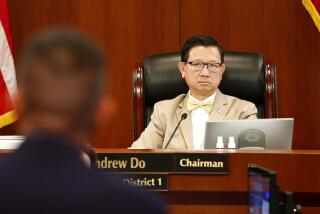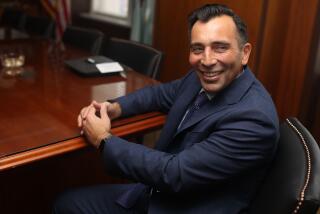Capitol Probe Shifts to Coastal Commissioner
The political corruption investigation that led to the resignation of Sen. Alan Robbins last month is now focused on one of the most influential non-elected public officials in the state, Mark L. Nathanson, a tough, combative member of the California Coastal Commission with strong ties to Assembly Speaker Willie Brown.
A Beverly Hills real estate broker and business consultant, Nathanson is the unnamed “public official” cited in charges against Robbins in the extortion of more than $200,000 from a San Diego hotel developer, sources familiar with the investigation told The Times.
Nathanson has not been charged and, through his attorney, has denied any impropriety.
Nathanson is unique among those targeted by federal authorities--the first political appointee to undergo FBI scrutiny since the investigation of political corruption began in the Capitol six years ago. The targeting of Nathanson, as well as the recent search of a prominent lobbyist’s office, signals that investigators have moved beyond their original objective of exposing and prosecuting corrupt lawmakers and legislative aides.
U. S. Atty. George O’Connell and his investigators are following the probe wherever it leads them--even if that takes them outside Capitol corridors to the offices of lobbyists or the meeting rooms of appointed boards and commissions.
In this instance, the investigation has led authorities to a man never elected to office, a brash, gun-toting political fund-raiser who owes his public career to friends in high places.
Appointed to a series of state and local positions, Nathanson has been dogged periodically with questions about his conduct in office in a public career that spans almost three decades.
It was the Speaker of the Assembly, a liberal San Francisco Democrat, who placed Republican Nathanson on the Coastal Commission in 1986--despite the fact that Nathanson had pleaded no contest to a misdemeanor attempted theft charge after being accused of taking a cash bribe in a West Hollywood parking lot 12 years earlier.
Brown has said he was unaware of the incident at the time of the appointment and, when it was called to his attention, he dismissed it as too long ago to be relevant.
Nathanson is one of four Brown appointees on the 12-member coastal panel, which regulates real estate development along 1,100 miles of California shoreline--a job of potentially enormous environmental and economic consequence.
Nathanson’s close ties to top Democrats, including Robbins and Brown, have made him virtually unassailable as a commissioner, despite periodic complaints by environmentalists that he has been too friendly to development interests.
Even before Robbins’ agreement to plead guilty was announced, these critics, including at least one lawmaker, were calling for Brown to remove Nathanson from the commission--a move that the Speaker is free to make whenever he chooses.
In recent months, fearing the political impact of a possible indictment, some of the Speaker’s associates have told him privately that Nathanson should be asked to step aside at least until federal investigators close their investigation, according to one source close to Brown.
But Brown, who attaches high value to personal loyalty, has steadfastly refused to remove Nathanson.
The Speaker “holds to the old-fashioned belief that someone is innocent until proven guilty,” Brown’s press secretary, Michael Reese, told a reporter a year ago, shortly after Nathanson’s home was raided by FBI agents armed with a search warrant.
Nathanson could not be reached for comment after the filing of charges against Robbins, but his attorney, Robert L. Shapiro, said his client is “going about his business activity and his work, and in his opinion, he hasn’t done anything wrong.”
Sources familiar with the federal probe say authorities are investigating allegations that Nathanson and Robbins acted together to extort $235,000 or more from Jack Naiman, a San Diego hotel developer.
These sources say Naiman has told a federal grand jury he believed that if he failed to make payments as directed by Robbins, his plans to build a major hotel in La Jolla would be scuttled and he would never be allowed to develop property along the California coast--the jurisdiction governed by Nathanson and his fellow coastal commissioners.
With Naiman making payouts at Robbins’ direction, the money was dispersed in circuitous ways, say those familiar with the charges against Robbins. According to the sources, the developer sent a check for $50,000 to a well-connected Century City law firm--Wyman, Bautzer, Christensen, Kuchel & Silbert. When Naiman, who apparently never spoke with Nathanson, learned that the money was credited to an account held for Nathanson, he demanded and received the money back.
Howard Weitzman, who served as a spokesman for the law firm before the partnership split up, acknowledged recently that federal investigators subpoenaed the firm’s records of the Naiman transaction.
Robbins has been cooperating with federal authorities for several months as part of his plea-bargain--at times wearing a hidden recording device--and is in a position to corroborate Naiman’s allegations, according to sources.
Shapiro, Nathanson’s attorney, said his client “was not that close” to the former senator, contradicting what others have told The Times. He said the two had not even spoken to each other during the past five to six months when Robbins was cooperating with the government.
Mark Leslie Nathanson, 52, has been active in local and state politics for more than 25 years, serving politicians of both parties in a career punctuated by controversy and occasional scandal. His first appointments to government posts came in the 1960s when Los Angeles Mayor Sam Yorty named him to various city boards and commissions.
Born in Chicago, Nathanson arrived in California with his family in 1946. His father opened a self-service market in Palm Springs, where he was active in local politics, serving on the City Council from 1950 through 1958.
The younger Nathanson studied business at USC for two years, according to court records. Those who know him say he made his first Hollywood connections while growing up in Palm Springs, hanging around a popular tennis club. He was employed briefly by Paramount Television as an apprentice film editor before becoming a real estate broker and advising sports and entertainment personalities on property investments.
Nathanson engenders strong feelings in those who know him.
Many who agreed to talk to reporters about Nathanson did so only after being promised anonymity--some because they did not want to be linked to an official who is the subject of a corruption investigation and others because they respected the influence he wields.
His enemies describe him as a ruthless influence peddler with a volatile temper.
Former coastal Commissioner Robert Franco, who often clashed with Nathanson, said: “He was never a friend and I consider that a badge of honor, because I dislike persons in public office who behave in such a rude and arrogant manner.”
Throughout his years on the Coastal Commission, Nathanson’s critics have complained that he has routinely badgered witnesses, intimidated staff and strayed outside public channels to meet privately with developers on issues pending before the commission.
And he has often won support for his positions.
Nathanson argued successfully for a new land-use plan governing development on the 27-mile Malibu coast. Conservationists say the plan eliminated many environmental safeguards that the panel had endorsed just a year or so before, in 1985.
Commissioner David L. Malcolm, another Brown appointee to the panel, described Nathanson as an intelligent, constructive member of the commission, someone who has worked well with local government officials in solving problems in the coastal zone.
Malcolm said other commissioners object to the way that Nathanson can take charge of a meeting and dominate a discussion. “Some people might not like that and are jealous of that,” Malcolm said.
Those who know Nathanson socially describe a charming, solicitous host and an engaging story-teller.
“He could meet someone of authority at a party and two weeks later they would be best of friends,” said one longtime acquaintance. “He is the best at it I have ever seen.”
One adviser to Brown described Nathanson holding a hotel kitchen open after a 1990 fund-raiser and dinner that lasted late into the night because the Speaker had been so busy he did not get to eat his meal.
Several of his acquaintances described Nathanson’s habit of carrying a concealed weapon and taking apparent pleasure in displaying it.
“Mark was very proud of that gun permit,” said one former associate. “They were impossible to get, or so he told me.”
Nathanson got his permit to carry a concealed weapon from the Culver City Police Department, which made him a reserve police officer in 1988.
Known as a skilled fund-raiser or “rainmaker,” Nathanson has gathered money for a number of candidates at the state and national levels, according to those who have dealt with him.
From time to time, he has donated significant amounts of money to politicians.
Most of that money in recent years has gone to the Speaker--$12,000 out of $18,300 he gave to lawmakers between 1985 and 1990, according to figures compiled from Legi-Tech, a campaign contribution recording service.
Nathanson and Brown are more than political allies--they are friends as well.
In 1987, Nathanson arranged a 52nd birthday party for the Speaker at the Beverly Hills estate of actor George Hamilton--to which 52 of Brown’s friends were invited.
Brown’s friends credit Nathanson with giving the Speaker entree to the glitzy world of Hollywood celebrities. Nathanson has been a consultant to several entertainment industry executives, including producer Aaron Spelling.
In return, Brown has given Nathanson elevated stature. “Once Mark started hanging out with Willie (Brown) . . . it really made him a big man,” said one acquaintance.
In recent years, Nathanson has served simultaneously as Brown’s appointee on the Coastal Commission and the California Commission on Aviation and Airports, which was disbanded in January.
Brown has also continued to reappoint Nathanson’s father, Jerome Nathanson, to the state Athletic Commission. The elder Nathanson, who holds a civil service job with Los Angeles County’s senior citizens services department, began serving on the commission in 1983 after being appointed by Gov. Edmund G. (Jerry) Brown Jr.
Thoroughly bipartisan in his alliances, Mark Nathanson was named by Los Angeles County Supervisor Mike Antonovich, a Republican, to the county Small Craft Harbor Commission, which oversees leases in county-owned Marina del Rey.
FBI investigators are not the first to examine Nathanson’s conduct in public office.
Just after leaving the city Building and Safety Commission in 1973, Nathanson was arrested in a West Hollywood parking lot on suspicion of soliciting a $2,500 bribe from a businessman turned police informant. A member of the Los Angeles County Delinquency and Crime Commission at the time, Nathanson pleaded no contest to a reduced, misdemeanor charge of attempted grand theft, for which he was given three years’ probation and a $2,500 fine.
In court papers he explained his misgivings about agreeing to a plea-bargain, saying that he was “guilty of puffing and not being forthright” with the businessman, but that he had “earned all the money and performed the job I was hired to do.”
The county probation report described Nathanson as a driven, goal-oriented person, who thought himself unworthy because he had never pursued a professional career.
Nathanson was in trouble again in 1986 when he agreed to pay a $13,400 fine to the Fair Political Practices Commission for failing to fully disclose his income and investments while serving as an appointee of Gov. Brown to the watchdog Little Hoover Commission between 1983 and 1985. In a statement issued at the time, Nathanson described the fine as excessive. He admitted ignoring the requirements of the conflict-of-interest disclosure statute “because I assume no one would care.”
As early as 1987, Assemblyman Tom Hayden (D-Santa Monica), citing the 1973 bribery case and the FPPC fine, questioned Speaker Brown about the wisdom of appointing Nathanson to the coastal panel.
In a confidential letter to Brown obtained by The Times, Hayden complained of Nathanson’s role in pushing through the huge Playa Vista project near Marina del Rey--a massive residential-office-hotel development. Hayden warned Brown about the potential for scandal at the commission, saying, “I know of no evidence that Mr. Nathanson is a keen student of the environment. Rather, he is widely depicted as a wheeler-dealer, fund-raiser and fixer.”
In his response, Brown said he was not aware of the 1973 incident when he named Nathanson to the panel and that it did not justify his friend’s removal from the commission. “I tend to be reluctant to judge someone’s character, competence or ability based upon evidence so remote,” Brown told Hayden.
In the wake of Robbins’ plea agreement, Hayden, whose district stretches from Malibu to Venice, has joined environmentalists in calling for Nathanson’s removal from the commission as “a positive first step in the process of rebuilding the Coastal Commission as a bulwark of coastal protection.”
Times staff writer Robert W. Stewart also contributed to this report.
More to Read
Get the L.A. Times Politics newsletter
Deeply reported insights into legislation, politics and policy from Sacramento, Washington and beyond. In your inbox three times per week.
You may occasionally receive promotional content from the Los Angeles Times.






